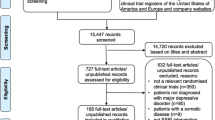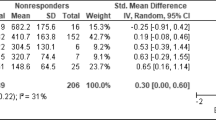Abstract
Rationale
A number of reviews have claimed that the selective serotonin and noradrenalin re-uptake inhibitor venlafaxine is more effective than selective serotonin re-uptake inhibitors (SSRIs) in achieving remission and symptom reduction in major depression.
Objectives
The aim of this study was to systematically review studies on the efficacy of venlafaxine vs SSRI and to evaluate the influence of methodological issues on the effect sizes.
Materials and methods
Following a systematic literature search, we pooled data on depression scores, response, remission and dropout rates. We also performed sub-group analyses.
Results
Seventeen studies were included. We found no significant superiority in remission rates (risk ratio [RR] = 1.07, 95% confidence intervals [95%CI] = 0.99 to 1.15, numbers needed to treat [NNT] = 34) and a small superiority in response rates (RR = 1.06, 95%CI = 1.01 to 1.12, NNT = 27) over SSRIs. There was a small advantage to venlafaxine in change scores (effect size = −0.09, 95%CI = −0.16 to −0.02, p = 0.013), which did not reach significance when post-treatment scores were used (effect size = −0.06, 95%CI = −0.13 to 0.00). Discontinuation rates due to adverse events were 45% higher in the venlafaxine group. The main reasons for the differences between this analysis and previous reviews were the exclusion of studies with methodological limitations, avoiding to pool selectively reported study results and exclusion of studies available as abstracts only.
Conclusions
Our analysis does not support a clinically significant superiority of venlafaxine over SSRIs. Differences between our study and previous reviews were not accounted for by technical aspects of data synthesis, but rather by study selection and choice of outcome parameters.



Similar content being viewed by others
References
Allard P, Gram L, Timdahl K, Behnke K, Hanson M, Sogaard J (2004) Efficacy and tolerability of venlafaxine in geriatric outpatients with major depression: a double-blind, randomised 6-month comparative trial with citalopram. Int J Geriatr Psychiatry 19:1123–1130
Alves C, Cachola I, Brandao J (1999) Efficacy and tolerability of venlafaxine and fluoxetine in outpatients with major depression. Prim Care Companion J Clin Psychiatry 5:57–63
American Psychiatric Association (2000) Practice guideline for the treatment of patients with major depressive disorder (revision). Am J Psychiatry 157:1–45
Anderson IM (2001) Meta-analytical studies on new antidepressants. Br Med Bull 57:161–178
Ballus C, Quiros G, De Flores T, de la Torre J, Palao D, Rojo L, Gutierrez M, Casais L, Riesgo Y (2000) The efficacy and tolerability of venlafaxine and paroxetine in outpatients with depressive disorder or dysthymia. Int Clin Psychopharmacol 15:43–48
Barbui C, Cipriani A, Brambilla P, Hotopf M (2004) “Wish bias” in antidepressant drug trials? J Clin Psychopharmacol 24:126–130
Bielski RJ, Ventura D, Chang CC (2004) A double-blind comparison of escitalopram and venlafaxine extended release in the treatment of major depressive disorder. J Clin Psychiatry 65:1190–1196
Borenstein M, Hedges L, Higgins J, Rothstein H (2005) Comprehensive meta-analysis, version 2. Biostat, Englewood, NJ
Cipriani A, Geddes J, Barbui C (2007) Venlafaxine for major depression. More evidence that risks outweigh benefits for most patients? BMJ 334:215–216
Clerc GE, Ruimy P, Verdeau-Pailles J (1994) A double-blind comparison of venlafaxine and fluoxetine in patients hospitalized for major depression and melancholia. Int Clin Psychopharmacol 9:139–143
Costa e Silva J (1998) Randomized, double-blind comparison of venlafaxine and fluoxetine in outpatients with major depression. J Clin Psychiatry 59:352–357
Danish University Antidepressant Group (1986) Citalopram: clinical effect profile in comparison clomipramine: a controlled multicenter study. Psychopharmacology 90:131–138
Danish University Antidepressant Group (1990) Paroxetine: a selective serotonin reuptake inhibitor showing better tolerance, but weaker antidepressant effect than clomipramine in a controlled multicenter study. J Affect Disord 18:289–299
Dierick M, Ravizza L, Realini R, Martin A (1996) A double-blind comparison of venlafaxine and fluoxetine for treatment of major depression in outpatients. Prog Neuropsychopharmacol Biol Psychiatry 20:57–71
Egger M, Smith GD, Altman DG (2001) Systematic reviews in health care: meta-analysis in context. BMJ Books, London
Einarson TR, Arikian, SR, Casciano J (1999) Comparison of extended-release venlafaxine, selective serotonin reuptake inhibitors, and tricyclic antidepressants in the treatment of depression: a meta-analysis of randomized controlled trials. Clin Ther 21:296–308
Fochtman LJ, Gelenberg A, Fochtman LJ (2006) Guideline watch: practice guideline for the treatment of patients with major depressive disorder, 2nd edition. Available at: http://www.psych.org/psych_pract/treatg/pg/MDD.watch.pdf. Accessed October 6, 2006
Frank E, Prien RF, Jarrett RB (1991) Conceptualization and rationale for consensus definitions of terms in major depressive disorder. Remission, recovery, relapse, and recurrence. Arch Gen Psychiatry 48:851–855
Freemantle N, Calvert M (2007) Weighing the pros and cons for composite outcomes in clinical trials. J Clin Epidemiol 60:658–659
Furukawa TA, Barbui C, Cipriani A, Bambilla P, Watanabe N (2006) Imputing missing standard deviations in meta-analyses can provide accurate results. J Clin Epidemiol 59:7–10
Geddes JR, Freemantle N, Mason J (2006) Selective serotonin reuptake inhibitors (SSRIs) versus other antidepressants for depression (Cochrane Review). In: The Cochrane Library, Issue 3, 2006. Update Software, Oxford
Geerts S, Lacante P, Mignon A (1999) Venlafaxine versus fluoxetine in the treatment of depressed patients with concomitant anxiety. Eur Neuropsychopharmacol 9:S224
Hansen RA, Gartlehner G, Lohr KN (2005) Efficacy and safety of second-generation antidepressants in the treatment of major depressive disorder. Ann Intern Med 143:415–426
Higgins JPT, Thompson SG, Deeks JJ (2003) Measuring inconsistency in meta-analyses. BMJ 327:557–560
Jorgensen AW, Hilden J, Gotzsche PC (2006) Cochrane reviews compared with industry supported meta-analyses and other meta-analyses of the same drugs: systematic review. BMJ 333:782
Kavirajan H (2004) Venlafaxine and SSRI remission data revisited. Br J Psychiatry 184:452–453
Keller MB (2003) Past, present, and future directions for defining optimal treatment outcome in depression: remission and beyond. JAMA 289:3152–3160
Kennedy SH, Andersen HF, Lam RW (2006) Efficacy of escitalopram in the treatment of major depressive disorder compared with conventional selective serotonin reuptake inhibitors and venlafaxine XR: a meta-analysis. J Psychiatry Neurosci 31:122–131
Kessler RC, Demler O, Frank RG (2005) Prevalence and treatment of mental disorders, 1990 to 2003. N Engl J Med 352:2515–2523
Khan A, Leventhal RM, Khan SR, Brown WA (2002) Severity of depression and response to antidepressants and placebo: an analysis of the Food and Drug Administration database. J Clin Psychopharmacol 22:40–45
Lieberman JA, Greenhouse J, Hamer RM, Krishnan KR, Nemeroff CB, Sheehan DV, Thase ME, Keller MB (2005) Comparing the effects of antidepressants: consensus guidelines for evaluating quantitative reviews of antidepressant efficacy. Neuropsychopharmacology 30:445–460
MacGillivray S, Arroll B, Hatcher S, Ogston S, Reid I, Sullivan F, Williams B, Crombie I (2003) Efficacy and tolerability of selective serotonin reuptake inhibitors compared with tricyclic antidepressants in depression treated in primary care: systematic review and meta-analysis. BMJ 326:1014
Machado M, Iskedjian M, Riuz I, Einarson TR (2006) Remission, dropouts, and adverse drug reaction rates in major depressive disorder: a meta-analysis of head-to-head trials. Curr Med Res Opin 22:1825–1837
McPartlin GM, Reynolds A, Anderson C, Casoy J (1998) A comparison of once-daily venlafaxine XR and paroxetine in depressed outpatients treated in general practice. Prim Care Companion J Clin Psychiatry 4:127–132
Mehtonen O-P, Sogaard J, Roponen P, Behnke K (2000) Randomized, double-blind comparison of venlafaxine and sertraline in outpatients with major depressive disorder. J Clin Psychiatry 61:95–100
Moher D, Jones A, Cook DJ (1998) Does quality of reports of randomised trials affect estimates of intervention efficacy reported in meta-analysis? Lancet 352:609–613
Moja LP, Telaro E, D’Amico R (2005) Assessment of methodological quality of primary studies by systematic reviews: results of the metaquality cross sectional study. BMJ 330:1053
Montgomery SA, Huusom AKT, Bothmer J (2004) A randomised study comparing escitalopram with venlafaxine XR in primary care patients with major depressive disorder. Neuropsychobiology 50:57–64
National Institute for Health and Clinical Excellence (2004) Management of depression in primary and secondary care. National Clinical Practice Guideline Number 23. Available at: http://www.nice.org.uk/CG023NICEguideline. Accessed October 13, 2006
Nemeroff CB, Thase ME (2007) A double-blind, placebo-controlled comparison of venlafaxine and fluoxetine treatment in depressed outpatients. J Psychiatr Res 41:351–359
Paykel ES (2002) Achieving gains beyond response. Acta Psychiatr Scand Suppl 106:12–17
Roose SP, Schatzberg AF (2005) The efficacy of antidepressants in the treatment of late-life depression. J Clin Psychopharmacol 25:S1–S7
Rudolph RL (2002) Achieving remission from depression with venlafaxine and venlafaxine extended release: a literature review of comparative studies with selective serotonin reuptake inhibitors. Acta Psychiatr Scand Suppl 106:24–30
Rudolph RL, Feiger AD (1999) A double-blind, randomized, placebo-controlled trial of once-daily venlafaxine extended release (XR) and fluoxetine for the treatment of depression. J Affect Disord 56:171–181
Rudolph RL, Fabre LF, Feighner JP, Rickels K, Entsuah R, Derivan AT (1998) A randomized, placebo-controlled, dose–response trial of venlafaxine hydrochloride in the treatment of major depression. J Clin Psychiatry 59:116–122
Salinas E, Venlafaxine-XR-Study-Group (1997) Once-daily extended release (XR) venlafaxine versus paroxetine in outpatients with major depression. Biol Psychiatry 42(Suppl I):297S
Schatzberg A, Roose S (2006) A double-blind, placebo-controlled study of venlafaxine and fluoxetine in geriatric outpatients with major depression. Am J Geriatr Psychiatry 14:361–370
Shelton C, Entsuah R, Padmanabhan SK (2005) Venlafaxine XR demonstrates higher rates of sustained remission compared to fluoxetine, paroxetine or placebo. Int Clin Psychopharmacol 20:233–238
Shelton RC, Haman KL, Rapaport MH, Kiev A, Smith WT, Hirschfeld RM, Lydiard RB, Zajecka JM, Dunner DL (2006) Randomized, double-blind, active-control study of sertraline versus venlafaxine XR in major depressive disorder. J Clin Psychiatry 67:1674–1681
Silverstone PH, Ravindran A (1999) Once-daily venlafaxine extended release (XR) compared with fluoxetine in outpatients with depression and anxiety. J Clin Psychiatry 60:22–28
Sir A, D’Souza RF, Uguz S, George T, Vahip S, Hopwood M (2005) Randomized trial of sertraline versus venlafaxine XR in major depression: efficacy and discontinuation symptoms. J Clin Psychiatry 66:1312–1320
Smith D, Dempster C, Glanville J, Freemantle N, Anderson I (2002) Efficacy and tolerability of venlafaxine compared with selective serotonin reuptake inhibitors and other antidepressants: a meta-analysis. Br J Psychiatry 180:396–404
Solomon DA, Keller MB, Leon AC, Mueller TI, Lavori PW, Shea MT (2000) Multiple recurrences of major depressive disorder. Am J Psychiatry 157:229–233
Thase ME, Entsuah AR, Rudolph RL (2001) Remission rates during treatment with venlafaxine or selective serotonin reuptake inhibitors. Br J Psychiatry 178:234–241
Thiessen Philbrooke H, Barrowman N, Garg AX (2007) Imputing variance estimates do not alter the conclusions of a meta-analysis with continuous outcomes: a case study of changes in renal function after living kidney donation. J Clin Epidemiol 60:228–240
Tylee A, Beaumont G, Bowden MW, Reynolds A (1997) A double-blind, randomized, 12-week comparison study of the safety and efficacy of venlafaxine and fluoxetine in moderate to severe major depression in general practice. Prim Care Companion J Clin Psychiatry 3:51–58
Tzanakaki M, Guazzelli M, Nimatoudis I, Zissis NP, Smeraldi E, Rizzo F (2000) Increased remission rates with venlafaxine compared with fluoxetine in hospitalized patients with major depression and melancholia. Int Clin Psychopharmacol 15:29–34
Zanardi R, Franchini L, Serretti A (2000) Venlafaxine versus fluvoxamine in the treatment of delusional depression: a pilot double-blind controlled study. J Clin Psychiatry 61:26–29
Zimmerman M, Posternak MA, Chelminski I (2005) Is the cutoff to define remission on the Hamilton Rating Scale for Depression too high? J Nerv Ment Dis 193:170–175
Acknowledgements
All authors have been involved in a health technology assessment (HTA) project on the efficacy of selective serotonin and noradrenalin re-uptake inhibitors in major depression, which was funded by the German Institute for Quality and Efficiency in Health Care (IQWiG). However, apart from the literature search, this paper is entirely independent of the HTA project and based solely on published data. It may differ in its methods and conclusions and has therefore neither prejudicial quality nor does it anticipate any results of the HTA report. The paper does not necessarily reflect the opinion of the IQWiG.
The present study received no further external funding.
We thank two anonymous reviewers for valuable comments.
Author information
Authors and Affiliations
Corresponding author
Electronic supplementary material
Below is the link to the electronic supplementary material.
Electronic supplementary material
(DOC 179 kb)
Rights and permissions
About this article
Cite this article
Weinmann, S., Becker, T. & Koesters, M. Re-evaluation of the efficacy and tolerability of venlafaxine vs SSRI: meta-analysis. Psychopharmacology 196, 511–520 (2008). https://doi.org/10.1007/s00213-007-0975-9
Received:
Accepted:
Published:
Issue Date:
DOI: https://doi.org/10.1007/s00213-007-0975-9




